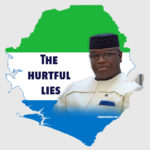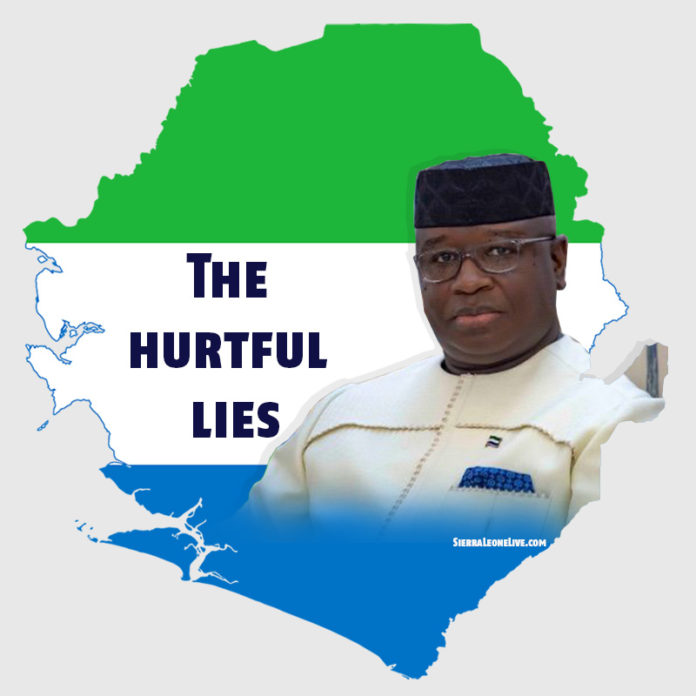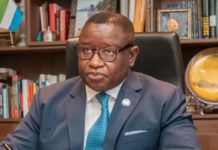

I don’t want to talk today about the village of Thampèreh and its many problems. Thampèreh can wait.
Today I want to talk about Sierra Leone and the hurtful lies told by those we trusted to lead us. I want to talk about the repeated lies turning into insults.
Sierra Leoneans are not asking for much. They are not saying their government should fix all the problems in four years. The people want the government to improve the necessities.
And if you can’t, be honest about it.
Many Sierra Leoneans understand the impact of Covid-19 on the supply chain and the global economy. Many people know how the Russia-Ukraine war disrupted the supply of certain goods and commodities. They also know how other countries have at least found ways to mitigate the impact of Covid and the Russia-Ukraine war on their people. But this is not about comparing what other countries have done or didn’t do.
Last month, a pregnant woman and her child died in Kamakwie. She died while giving birth at the government hospital. Her husband, Ibrahim, is an Okada rider. He was at work when his wife went into labour. The family tried calling Ibrahim to inform him about his wife, but his phone was off the whole day. He had taken his phone to a telecenter to charge while he “hustles” to feed his family. Ibrahim found out about the death of his wife hours after she passed away.
How do you explain your maternal and child mortality rate reduction and your 24/7 rural electrification project to Ibrahim? You even mentioned his town as one of the places you have provided electricity. But Ibrahim had only seen poles lying on the side of the streets and depended on a telecenter to charge his phone. He couldn’t be with his wife in her last moments for the lack of electricity. Still, you look directly in his eyes and tell him you provided him and his people 24 hours of uninterrupted electricity.
Two weeks ago, a young businessman had a terrible accident on his way to Makeni from Freetown. He died on the spot. The family took his body to the government hospital in Makeni. But there was no electricity, and the standby generator had problems. The family had to travel with the body to Connaught hospital in Freetown and had it kept at the morgue there. Imagine what the family had to go through. Just hours after losing their loved one, the system forced them to sit beside the body, look at their dead loved one for hours, and travel for miles to the city to preserve the body before burial.
How do you explain your 24 hours uninterrupted rural electrification to this family?
Mr F.A.T is a teacher at the Bureh Secondary School in Mange Bureh. FAT taught for over twenty (20) years. All he knows is teaching mathematics and trying to make a difference in the lives of his students. He even dedicated his weekends to helping students with extra classes because the only thing he knows how to do is teach and transfer knowledge to his students. But lately, each time FAT picks up his radio to listen to the news; he hears the government talk about increased investment in the education sector. The government talks about the amount of money spent on providing training for teachers. He heard about an increase in salaries for teachers. But that increase didn’t reflect on his salary. FAT and his colleagues decide to protest the salary increase. Instead, the minister of education tells FAT and his colleagues that they should be grateful for receiving salaries because they are unqualified and untrained teachers. Throughout Mr FAT’s twenty-plus years of teaching, he was considered a qualified teacher. Now his qualification is questioned because he asked for an increase in his salary. They tell him that his salary matches his qualification, a grade one teacher. But no one asked whether his teaching responsibilities were limited to a grade one teacher or exceeded that. And some say what the minister’s assistant receives as a monthly salary is equivalent to the monthly salary of at least fifty (50) teachers.
Mariama lives in Waterloo. She and her friends attempted sitting her WASSCE three times but didn’t make it. Mariama is a smart girl. Even her teachers consider her among the smartest in her class. But each time she sat to her WASSCE, she got back poor results. The West African Examination Council has lost control of the regional exams, especially for Sierra Leone. A criminal syndicate of WASSCE results sellers has taken over the examination system. So, even when some students work hard, this cartel makes it difficult to pass if they don’t pay extra money. Last year, Mariama and her friends decided to use the syndicate. They each paid Le500,000 to have the cartel take the exams on their behalf. Even though they all went into the exam halls and had question papers given to them, a syndicate member sat in a room somewhere and filled their answer sheets. Mariama and six other students from her neighbourhood “passed” their WASSCE last year.
Will Mariama and her friends be included in the data among students who passed their WASSCE last year? Are they part of the increase in the number of passes due to the Free Quality Education program?
Last year, through the ministry of finance, the government announced a 25% salary increase for most civil servants, including the audit service, Statistics Sierra Leone, and the Anti-Corruption Commission. Since that announcement, many of the staff at the ACC are yet to see an increase in their salaries. President Bio reiterated the salary increase in his Labor Day speech. The ACC staff raised the issue with their bosses, including the commissioner himself, but they got nothing. The ACC recently began sending messages threatening to punish any staff if they continue to raise the salary issue. Even when the money is meant for increasing staff salaries, the ACC said it would use the funds to expand its office by hiring more people. Many of the faces for the new roles are either relatives or girlfriends of senior ACC officials.
How do we expect the institution responsible for fighting corruption to effectively do its job if it isn’t accountable to its staff?
Increased investment in agriculture, but who benefits?
In its efforts to tackle food security in the country and its lack of access to arable land, the United Arab Emirates turns to Sierra Leone for land. UAE signs an agreement with the government of Sierra Leone and leases hectares of land to grow vegetables and fruits. UAE invests millions of dollars in its agriculture projects. It buys farming machines from China and the Middle East and ships them to Sierra Leone. It buys fertiliser from Morocco for its farms in Sierra Leone. After months of farming, the UAE harvests and ships ALL its produce to feed its people.
But the government of Sierra Leone included this “investment” in its annual report and considered it an increase in agriculture investment in the country. While UAE feeds its people with the harvest, the Sierra Leone government provides its people with the data on the tons of vegetables and fruits harvested from such farms.
There are nearly a dozen of such agreements in Sierra Leone. The government continues to boast about such agreements as part of its efforts to attract foreign investment. But none of the products is sold locally, and local employment is low because the farming is mechanised.
Even local entrepreneurs are often encouraged to “package” their products well to attract European or the “global” markets. And we continue to fill our local markets with imported goods from China and other Asian countries. We run to Vietnam to sign MoU to import rice. We import everything, including toothpicks and cotton buds, while criticising those who use a clean broomstick to remove the bits of food lodged between their teeth and those who use a neat feather to clean their ears. We argue about our need to export more and praise those who sell their products in European and Middle Eastern markets for “breaking” into foreign markets but turn back and call local farmers unpatriotic for taking their goods to Guinea and Liberia to sell.
It is time we reconsider our message to our people. Maybe it is time we encourage farmers to package their produce for local consumption. Maybe, we should turn our markets to those citizens who will never walk into a supermarket to shop. We can only afford to export our food if we have enough to eat at home. And the only investments we should consider increased investment in agriculture are those farms that would make us food sufficient.
And what’s up with this constant talk about this Lungi bridge?
Where is President Bio getting the courage to continue talking about the bridge when it’s not even a near possibility and priority? Doesn’t the President know that the only way to attract foreign investment is to strengthen the local economy through local initiatives? What sober-minded investor will put billions of US dollars in a country where you still can’t provide electricity and water for your people? And instead of looking for investment in the energy and water sector, you crave for the longest bridge in Africa in the darkest country on the continent? Ok Roi des Ponts, continue de rêver.
While the government continues to lie about improving the economy, the massive cost of running businesses in Sierra Leone forces several local businesses to shut down operations. It has caused others to cut the number of staff and their salaries.
It is expected that each time President Bio reads a speech filled with lies, people raise the issue of his speechwriters not doing him justice and leading him to read lies. While this might be true, the real injustice is the lies the President repeatedly tells the people of Sierra Leone. The speechwriters understand the President; they know his attitude and the things that would massage his ego. They write the things he likes. Four years ago, the President began telling lies, and no speechwriter was fired. Like Donald Trump, President Bio’s speechwriters often give him to read what he wants to hear, not what the people of Sierra Leone need to know about the work of their government. And they won’t mind giving him lies to read, even if those lies insult the people.




